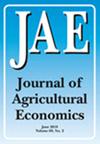The European Union‐Mercosur Association Agreement: Implications for the EU Livestock Sector
IF 4.2
2区 经济学
Q1 AGRICULTURAL ECONOMICS & POLICY
引用次数: 0
Abstract
Following 25 years of negotiations, the Mercosur countries and the European Commission reached a political agreement on a comprehensive association agreement in December 2024. However, its ratification is currently uncertain due to concerns of some European member states, among other issues, around possible negative impacts on their farm/livestock sectors. The main objective of this paper is to quantify these likely impacts. Our methodology elaborates on the general equilibrium framework used in previous sustainable impact assessments, where potential or illustrative agreements were analysed. We simulate both a full liberalisation scenario as well as a scenario simulating the more limited market‐opening offers in sensitive sectors, notably tariff rate quotas in agriculture. This allows us to identify the protective impact of these more limited offers. We also provide results for the main European member states and conduct several robustness analyses. We find that, because the beef offer is limited to additional import quotas, the negative impacts on livestock income are heavily muted. We also find that the European livestock sector, and more generally the farm and food industries, benefit from the income growth induced by the other components of the agreement. Finally, we do not find stronger negative effects in countries currently opposed to ratification, in particular France, because their consumers prefer domestic foods.欧盟-南方共同市场联盟协议:对欧盟畜牧业的影响
经过25年的谈判,南方共同市场国家和欧盟委员会于2024年12月就全面联系国协议达成政治协议。然而,由于一些欧洲成员国担心对其农场/畜牧业可能产生的负面影响,该条约的批准目前尚不确定。本文的主要目的是量化这些可能的影响。我们的方法详细阐述了以前可持续影响评估中使用的一般均衡框架,其中分析了潜在的或说明性的协议。我们既模拟了完全自由化的情景,也模拟了敏感行业(特别是农业的关税配额)更有限的市场开放提议的情景。这使我们能够确定这些更有限的优惠的保护性影响。我们还提供了欧洲主要成员国的结果,并进行了几次稳健性分析。我们发现,由于牛肉供应仅限于额外的进口配额,因此对牲畜收入的负面影响非常小。我们还发现,欧洲畜牧业,以及更普遍的农业和食品行业,受益于该协议其他组成部分带来的收入增长。最后,在目前反对批准的国家,特别是法国,我们没有发现更大的负面影响,因为它们的消费者更喜欢国内食品。
本文章由计算机程序翻译,如有差异,请以英文原文为准。
求助全文
约1分钟内获得全文
求助全文
来源期刊

Journal of Agricultural Economics
管理科学-农业经济与政策
CiteScore
7.90
自引率
2.90%
发文量
48
审稿时长
>24 weeks
期刊介绍:
Published on behalf of the Agricultural Economics Society, the Journal of Agricultural Economics is a leading international professional journal, providing a forum for research into agricultural economics and related disciplines such as statistics, marketing, business management, politics, history and sociology, and their application to issues in the agricultural, food, and related industries; rural communities, and the environment.
Each issue of the JAE contains articles, notes and book reviews as well as information relating to the Agricultural Economics Society. Published 3 times a year, it is received by members and institutional subscribers in 69 countries. With contributions from leading international scholars, the JAE is a leading citation for agricultural economics and policy. Published articles either deal with new developments in research and methods of analysis, or apply existing methods and techniques to new problems and situations which are of general interest to the Journal’s international readership.
 求助内容:
求助内容: 应助结果提醒方式:
应助结果提醒方式:


